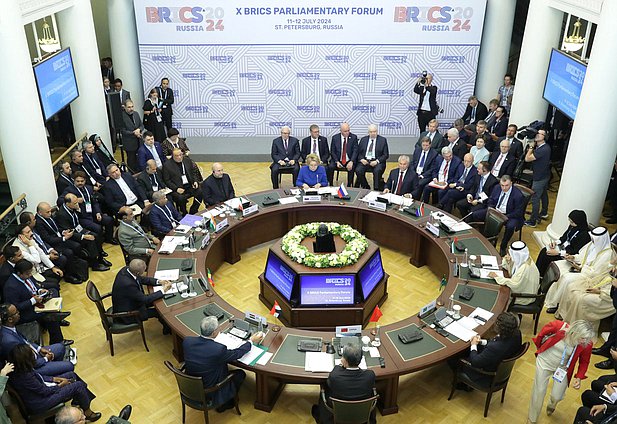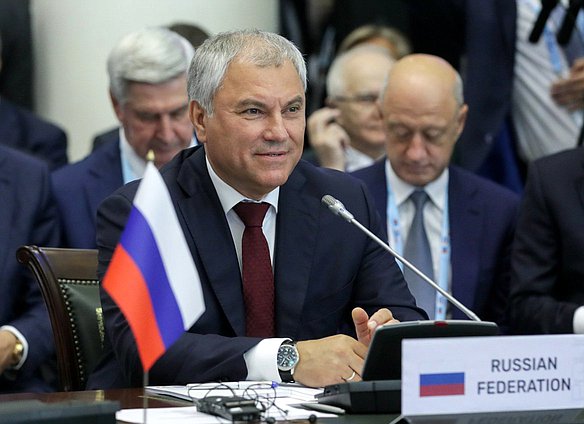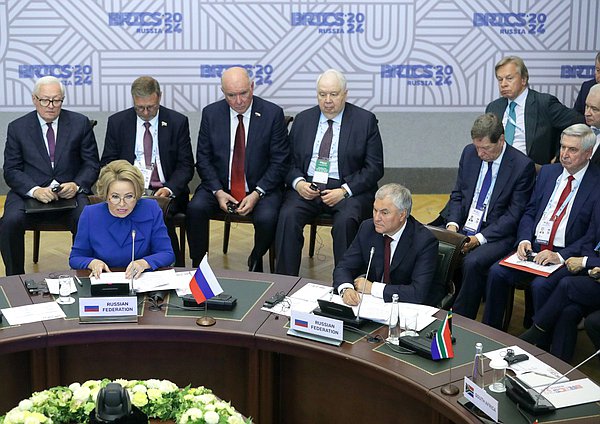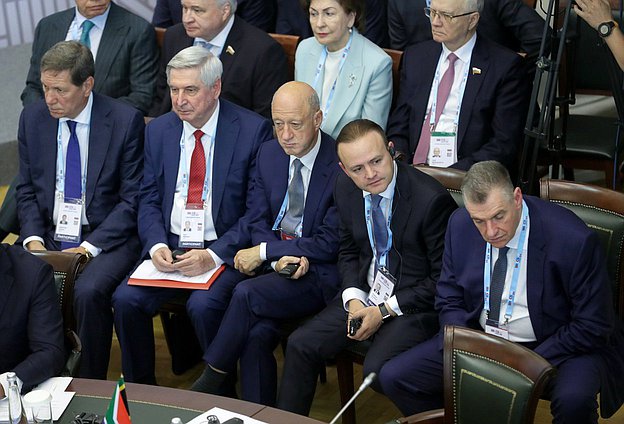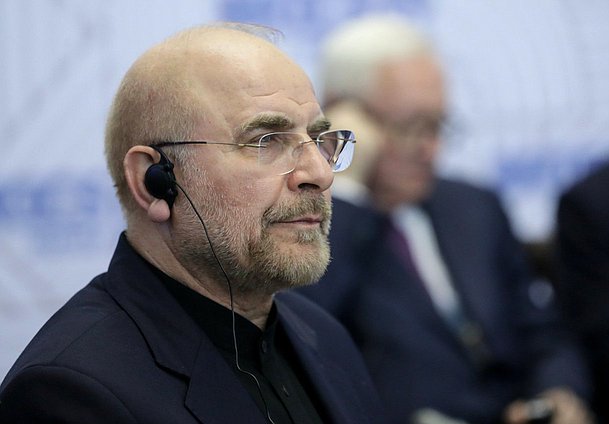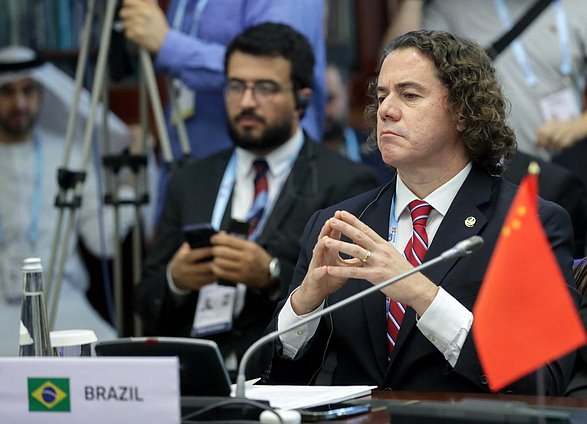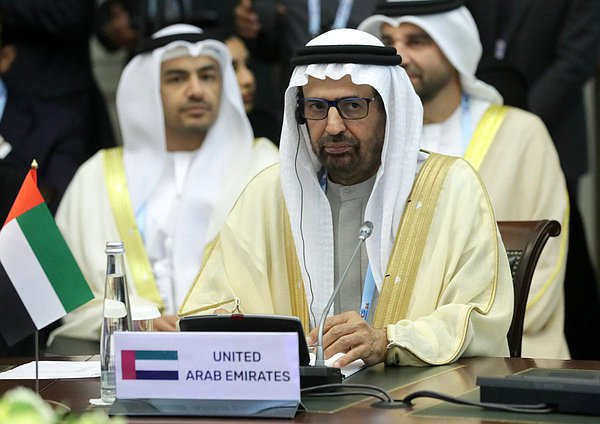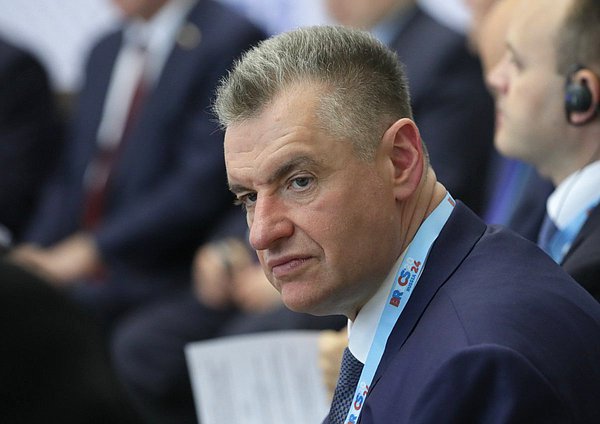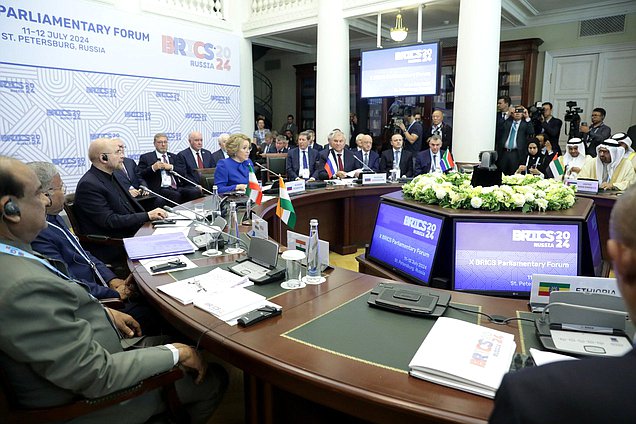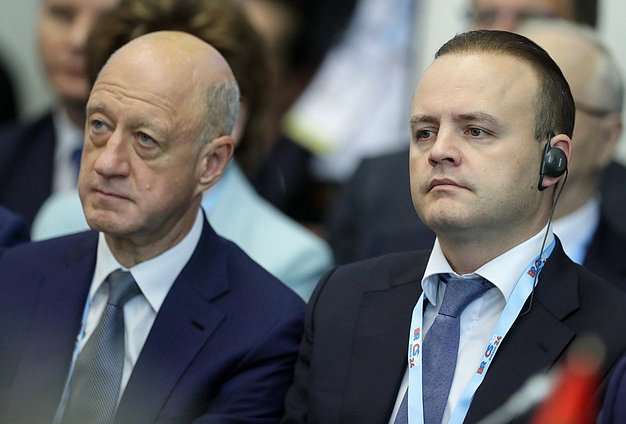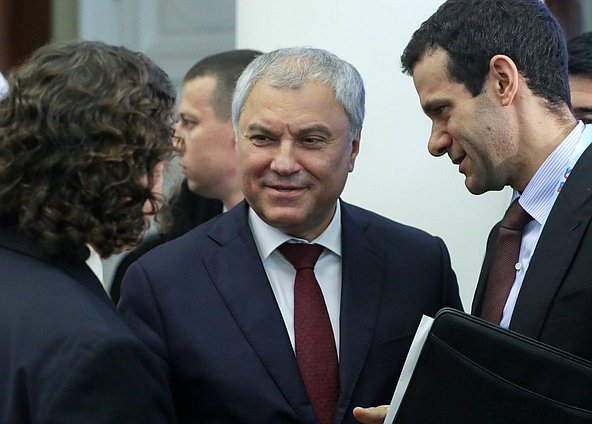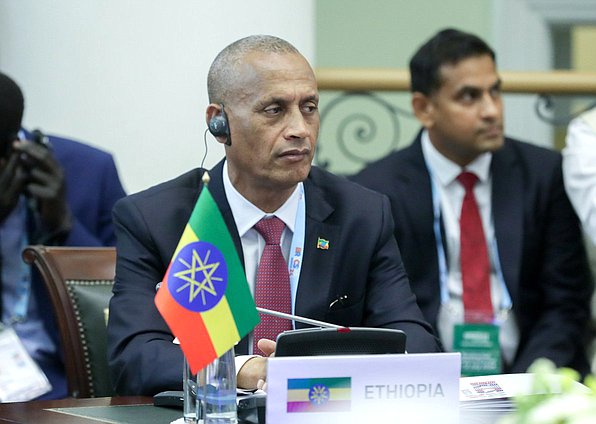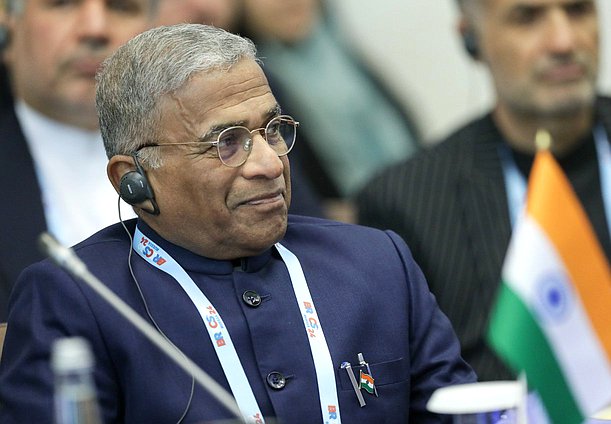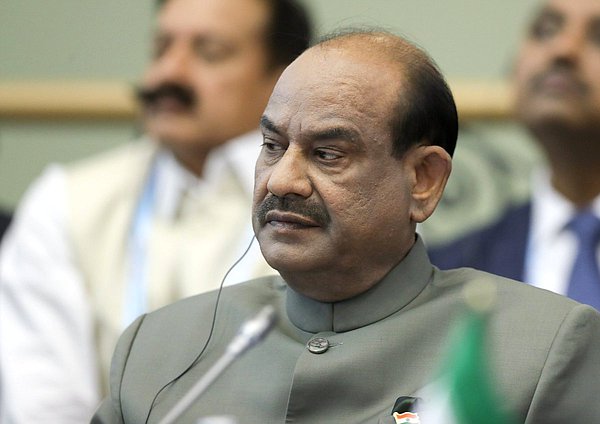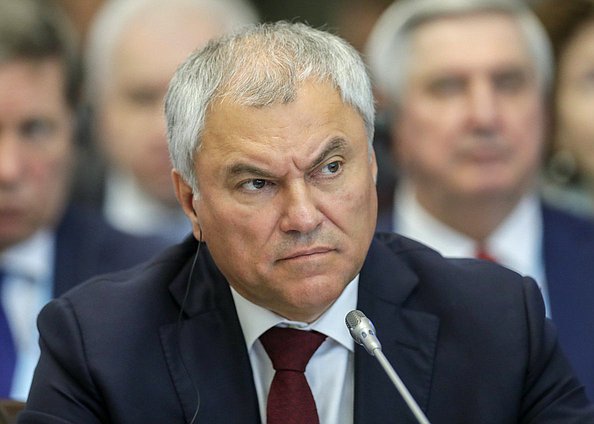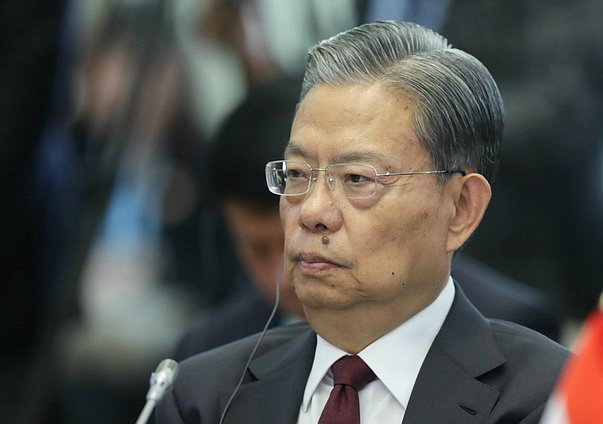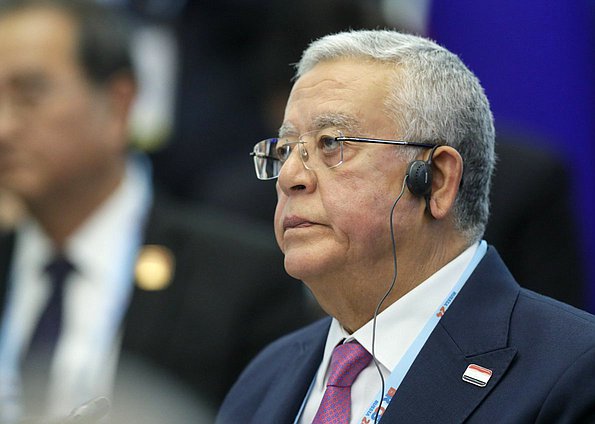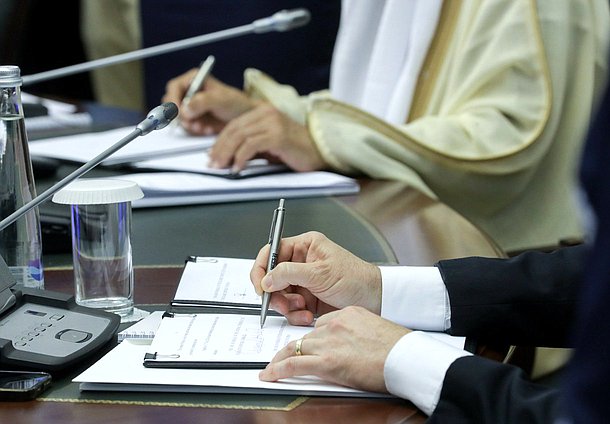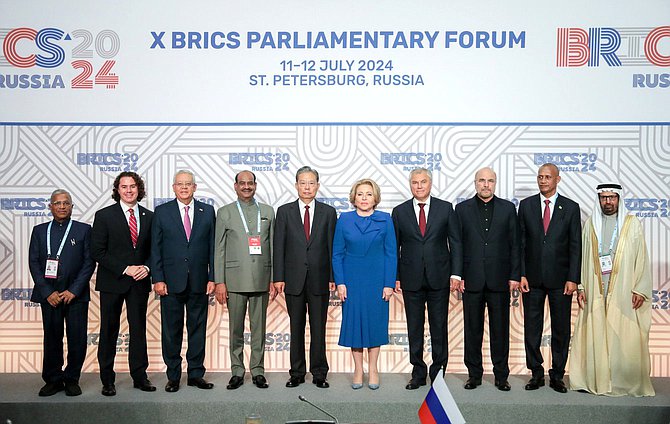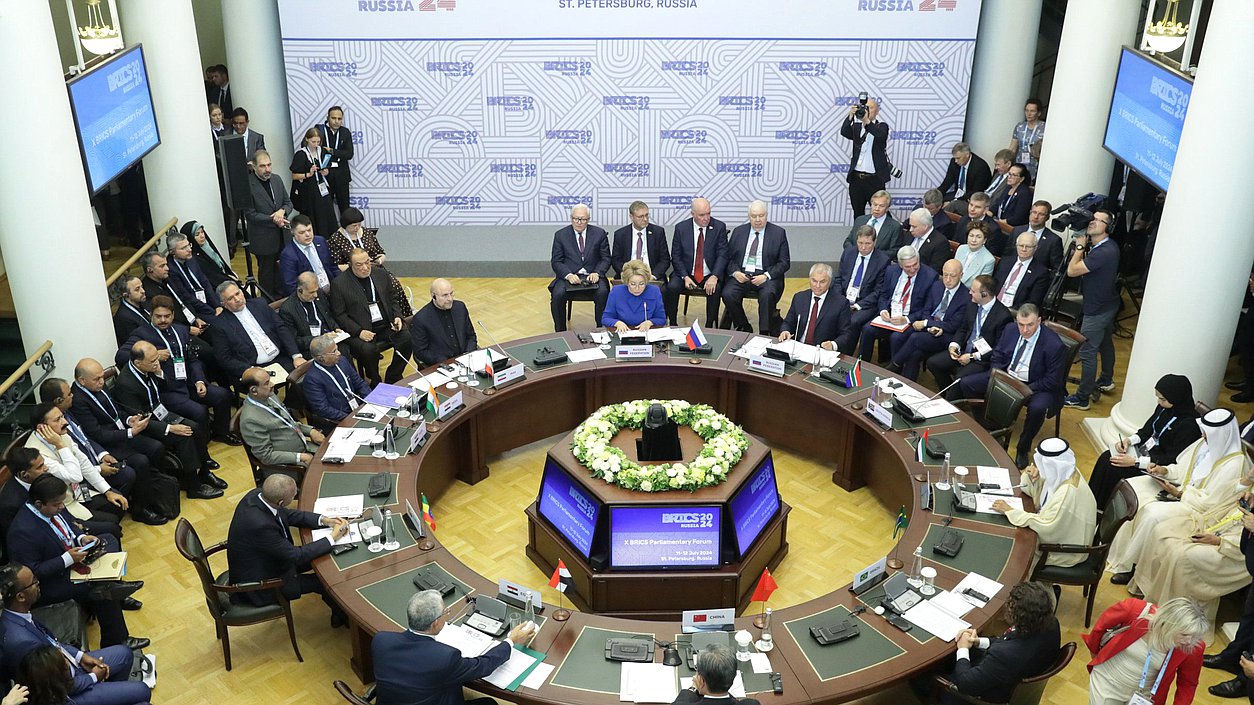
The plenary session “BRICS Parliamentary Dimension: Prospects for Strengthening Inter-Parliamentary Cooperation” was held at the Tauride Palace in St. Petersburg as part of the events of the 10th BRICS Parliamentary Forum.
Building relations on mutually beneficial terms
“Over the years
of its existence, the organization has turned into one of the largest economic
centers that represent the interests of the world majority. Our countries represent
more than a third of the world territories and 45% of the Earth’s population,”
said the Chairman of the State Duma Vyacheslav Volodin

Vyacheslav Victorovich
The Chairman of the State Duma of the Federal Assembly of the Russian Federation of the eighth convocation. Elected in single mandate constituency № 163 (Saratov constituency - Saratov Oblast)
at the plenary session.
According to him, the share of the BRICS states in global GDP at purchasing power parity has grown to 36.8%, exceeding the share of the G7 (29%), “and this gap will only increase.” He added that the three BRICS countries — China, India and Russia — are among the top 5 countries in terms of GDP at purchasing power parity.
“The major difference of BRICS is its willingness to build relations on equal, mutually beneficial terms to improve the quality of life of the citizens of each BRICS member state,” emphasized the Chairman of the State Duma.
In this regard, it is important, within the parliamentary dimension, to work more actively to implement the decisions taken by the leaders of the countries, to maintain a constant dialogue to bring cooperation to a new level, according to Vyacheslav Volodin.
“The agenda of our inter-parliamentary cooperation also includes issues of interaction in such fields as energy, science and new technologies, including artificial intelligence. It would be right to exchange lawmaking experience in these areas. The implementation of educational and scientific programs, the creation of joint research centers will help improve the efficiency of the economies of the BRICS member states,” added Vyacheslav Volodin.
Unity and multilateral dialogue
“The BRICS Parliamentary Forum is a vivid example of unity, mutual support, free multilateral dialogue, a symbol of the importance of parliamentary diplomacy in the coordinate system of interstate relations,” said the Speaker of the Federation Council Valentina Matvienko.
She expressed confidence that joint work at the 10th Parliamentary Forum would contribute to the preparation of the main event of the Russian chairmanship in BRICS — the summit which will be held in October in Kazan — and the proposals of parliamentarians would be taken into account.
The Chairman of the Standing Committee of the National People's Congress of China Zhao Leji in his speech emphasized that the parliaments of the BRICS member states made an important contribution to strengthening the strategic partnership of the member states of the organization.
“We should join our efforts at various levels and support each other, address together issues of common concern, and increase the level of trust between our countries,” he said.
“As for the legislative representatives, we should stand for multilateralism and common development, […] create an environment for entrepreneurship, contribute to conflict resolution, ensure joint harmonious cooperation, and develop artificial intelligence technologies,” said Zhao Leji.
The Speaker of the House of Representatives of the Arab Republic of Egypt Hanafy El Gebaly noted that the modern world faced a large number of serious challenges: from the threat of global conflicts to the climate change and migration issues.
“It is BRICS, a format of cooperation, that should breathe new life into the system of international cooperation and help [it] reach a new level,” emphasized Hanafy El Gebaly and added that the BRICS countries should help overcome global threats and ensure security at the international level.
“We have a responsibility to ensure that our legislative activities could help promote economic integration and create new opportunities for cooperation between our countries. It is necessary to remove all barriers and obstacles to trade, promote joint investments, provide opportunities for the development of infrastructure, and the development of advanced technologies,” added the Speaker of the House of Representatives of the Arab Republic of Egypt.
Agegnehu Teshager, Speaker of the House of Federation of the Federal Democratic Republic of Ethiopia, recalled that his country had joined BRICS earlier this year.
“We would like to declare our readiness to play a constructive role in contributing to the development of interpersonal ties at the BRICS level and the development of all mechanisms of cooperation within its framework. This also applies to interparliamentary relations,” he added.
Exchange of legislative
experience
“Inter-parliamentary cooperation will play a very important role in implementing the BRICS agenda,” said the Speaker of the Lok Sabha of the Parliament of the Republic of India Om Birla.
“We should share our best practices, our experiences, to bring prosperity for everyone,” emphasized Om Birla. “We can strengthen inter-parliamentary cooperation and make it more effective. Our parliaments can play a very important role in solving regional and global problems by creating strong institutions and enhancing inter-parliamentary cooperation, using modern technologies and building relations between people,” he added.
Mohammad Bagher Ghalibaf, Speaker of the Islamic Consultative Assembly of the Islamic Republic of Iran, said that many countries wanted to join BRICS. “We intend to resolve international disputes and conflicts together on an equal basis,” he emphasized.
He also noted enormous pressure of the Western states on Iran's economy. “We seek to de-dollarize BRICS, by using national currencies in mutual payments,” said Mohammad Bagher Ghalibaf.
“If we want to avoid a unilateral approach and achieve multilateralism, we should harmonize our legislative frameworks and build closer economic cooperation and political dialogue, stand for the rule of law,” he said.
According to the First Vice President of the Federal Senate of the National Congress of Brazil Veneziano Vital do Rêgo Segundo Neto, Brazil considers BRICS as an indispensable tool for reforming the international system of relations, which “will allow countries to develop, play a more important role, by reforming and strengthening the institutions of global governance and making them more capable of dealing with the great challenges of the 21st century.”
“We appreciate the opportunity to exchange best practices and experience, as well as to cooperate constructively with the BRICS member states to achieve common goals,” said Veneziano Vital do Rêgo Segundo Neto.
“Closer inter-parliamentary cooperation will also allow us to exchange best practices in the interests of the BRICS member states. Our main goal within the BRICS framework is to adopt laws that would contribute to the achievement of BRICS goals in all areas,” said Sara Mohammad Falaknaz, member of the Federal National Council of the United Arab Emirates, coordinator on BRICS affairs.
“This includes economic cooperation, technological development, culture, security, knowledge dissemination, capacity building, and personnel training. We should work closer with our BRICS partners for shared prosperity and overcoming the challenges we face,” she added. “We need to create a BRICS+ geopolitical group at the Inter-Parliamentary Union, which will allow us to speak with a single voice,” the parliamentarian also emphasized.
The meeting participants also signed a protocol to the Memorandum of Understanding on the BRICS Parliamentary Forum. “The document reflects our common vision of the substantive, organizational, procedural aspects of our forum’s activities for our further work,” said Valentina Matvienko.
On July 11–12, St. Petersburg hosts the 10th BRICS Parliamentary Forum at the Tauride Palace. As part of the events of the Forum, parliamentarians will discuss the role of parliaments in enhancing the efficiency of the system of international relations and ensuring its democratization, issues of countering the fragmentation of the multilateral trading system and the results of global crises. Aspects of inter-parliamentary humanitarian and cultural cooperation will also be discussed at the meetings.
The Russian Federation chairs BRICS in 2024.
